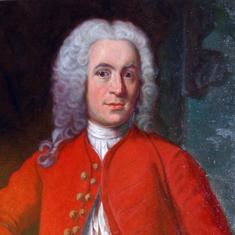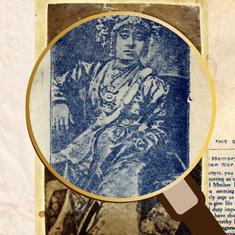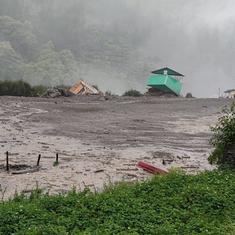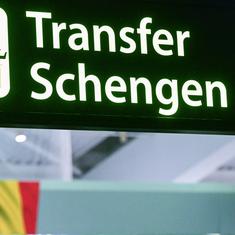Assam to drop foreigners tribunal cases against non-Muslims who entered state before 2015, cites CAA
Foreigners from six other religious communities who entered before 2015 ‘should be encouraged’ to apply for citizenship under the amended law, the state said.

The Assam Government has asked district authorities and members of the foreigners tribunals to drop cases against members of six communities – Hindu, Christian, Sikh, Buddhist, Jain and Parsi – who entered the state on or before December 31, 2014, citing the Citizenship Amendment Act.
The state’s home and political department held a meeting on July 17 and had discussed “issues related to Foreigners Tribunal with reference to Citizenship Amendment Act” and the “dropping off cases”. The meeting was held following a directive from Assam Chief Minister Himanta Biswa Sarma.
The Citizenship Amendment Act is aimed to provide a fast track to citizenship to refugees from six minority religious communities, except Muslims, from Bangladesh, Afghanistan and Pakistan, on the condition that they have lived in India for six years and have entered the country by December 31, 2014.
It was passed by Parliament in December 2019. The Union government notified the rules under the Act in March 2024.
The foreigners tribunals in Assam are quasi-judicial bodies that adjudicate on matters of citizenship based on lineage and a 1971 cut-off date. They rely primarily on documents submitted by persons to establish their family’s residency in Assam or India before 1971.
The tribunals have been accused of arbitrariness and bias, and declaring people foreigners on the basis of minor spelling mistakes, a lack of documents or lapses in memory.
Of the 1.6 lakh persons declared foreigners so far, more than 69,500 are Hindus.
The department, under which the border police and the foreigners tribunals function, directed district commissioners, police chiefs and members of the tribunals to submit an action taken report in the matter.
“As per the amendments made to the Citizenship Act, the FTs are not supposed to pursue cases of foreigners belonging to the six specified communities (Hindu, Christian, Buddhist, Sikh, Parsi and Jain communities) who had entered into Assam on or prior to 31.12.2014,” showed the minutes of the meeting signed by Ajay Tiwari, the additional chief secretary, home and political department.
Scroll has seen the document.
“It was suggested to drop all such cases,” the minutes added.
It added: “In this regard, the district commissioner and the senior SPs [superintendent of police] should immediately convene a meeting with their respective FT members and also review the developments periodically and submit the action taken report to this department.”
The notification sent to district authorities said that “foreigners should be encouraged and supported” for applying for Indian citizenship as per provisions of the Citizenship Amendment Act.
It also noted that the Assam government had issued “clear cut” instructions for withdrawal of all cases filed against persons belonging to the Gorkha and Koch-Rajbongshi communities. “This should be complied with forthwith,” the government said.
In July 2024, the Assam government had asked the state’s border police not to forward cases of non-Muslims who had entered India illegally before 2014 to foreigners tribunals.
The border police, which investigates citizenship cases, was told by the Assam home department at the time that the undocumented immigrants from the six communities should “be advised” instead to apply for citizenship on the Citizenship Amendment Act portal, and that their cases would be decided by the Union government.
Sarma had said at the time that existing cases would not be dropped.
Critics contend that the Citizenship Amendment Act undermines the 1985 Assam Accord between the Union government and the leaders of the Assam Movement, which was launched in 1979 to identify and deport undocumented immigrants.
The accord stipulates that anyone who entered Assam after the midnight of March 24, 1971, be identified and deported.
Assamese nationalist view “illegal migrants”, irrespective of their religion, as a threat to the state’s culture and resources.
The Citizenship Amendment Act had sparked massive protests in Assam and several other parts of the country in 2019 and 2020. However, the amended law was welcomed by Assam’s Bengali Hindus.
In August 2019, Assam published a National Register of Citizens with the aim of separating Indian citizens from undocumented immigrants living in the state. More than 19 lakh persons, or 5.7% of the applicants, were left out of the final list.
In March 2024, Sarma said five lakh Bengali Hindus, two lakh Assamese Hindu groups Koch-Rajbongshi, Das, Kalita and Sarma (Assamese), and 1.5 lakh Gorkhas had been left out of the National Register of Citizens.
The chief minister had also said that seven lakh Muslims are among the 19 lakh persons excluded from the register.
The ruling Bharatiya Janata Party had claimed that Hindus excluded from the register in Assam would be able to gain citizenship under the amended law. There have been fears that Muslims would be the only ones who stand to lose their citizenship in such an exercise.









